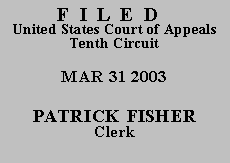

| UNITED STATES OF AMERICA, |
|
Before SEYMOUR, MURPHY, and O'BRIEN, Circuit Judges.
Ginger Lyn Breuil pleaded guilty to using a communication facility to cause or facilitate a felony drug offense in violation of 21 U.S.C. § 843(b). At sentencing, Breuil requested that the district court reduce her offense level by four levels on the basis that she was a minimal participant in the offense. See United States Sentencing Guidelines ("U.S.S.G.") § 3B1.2(a). The district court denied the request, concluding that although Breuil may have been a minimal participant in the overall conspiracy to distribute pseudoephedrine, she was not a minimal participant in the offense of conviction. Breuil appeals. This court exercises jurisdiction pursuant to 28 U.S.C. § 1291 and 18 U.S.C. § 3742 and affirms.
Breuil was named in five counts of a seventy-seven count indictment with one count of conspiring to manufacture and distribute controlled substances and four counts of actual distribution of pseudoephedrine, knowing or having reasonable cause to believe the pseudoephedrine would be used to manufacture a controlled substance, all in violation of 21 U.S.C. §§ 841 and 846. Pursuant to a plea agreement, the United States filed an information charging Breuil with utilizing a communication facility to cause or facilitate a felony drug offense in violation of 21 U.S.C. § 843(b). Breuil pleaded guilty to the § 843(b) charge set out in the information in exchange for the government's promise to recommend at the time of sentencing that the district court dismiss the indictment as it related to her. In calculating Breuil's offense level, the presentence report ("PSR") included only those amounts of pseudoephedrine actually distributed by Breuil; amounts of pseudoephedrine or controlled substances distributed by the larger conspiracy were not taken into account.
On appeal, Breuil contends that the district court erred in denying her a § 3B1.2 reduction in her offense level. In particular, she asserts that her extraordinarily limited participation in the conspiracy entitles her to the reduction. This court "review[s] the district court's factual findings regarding a defendant's role in the offense for clear error and give[s] due deference to the [district] court's application of the sentencing guidelines to the facts." United States v. James, 157 F.3d 1218, 1219 (10th Cir. 1998).
Breuil's argument that she is entitled to a § 3B1.2 reduction in her offense level is foreclosed both by the terms of the Sentencing Guidelines and by this court's precedents. Breuil was not convicted of participating in the overall conspiracy, but was, instead, allowed to plead guilty to the lesser crime of use of a communication facility. In these circumstances, the Guidelines specify that a reduction is not appropriate. U.S.S.G. § 3B1.2 app. n.3(B) ("If a defendant has received a lower offense level by virtue of being convicted of an offense significantly less serious than warranted by his actual criminal conduct, a reduction for a mitigating role under this section is ordinarily not warranted because such defendant is not substantially less culpable than a defendant whose only conduct involved the less serious offense."). Furthermore, in calculating Breuil's offense level, the district court included only those amounts of pseudoephedrine actually distributed by Breuil. This court has specifically held that a § 3B1.2 reduction is not appropriate in those circumstances. James, 157 F.3d at 1220 ("Here, [Defendant's] base offense level was predicated only on the amount of drugs he personally handled. Thus, the district court necessarily took into account [Defendant's] minor role in the drug trafficking enterprise. To provide a further reduction for his role in the enterprise would amount to finding [Defendant] a minor participant in [his] own conduct, a finding that would make[] no sense." (quotation omitted)).
Based on the text of the application notes to § 3B1.2 and this court's decision in James, it is clear that the district court did not err in denying Breuil a reduction in her base offense level. Accordingly, the judgment and sentence of the United States District Court for the District of Kansas is hereby AFFIRMED.
ENTERED FOR THE COURT
Michael R. Murphy
Circuit Judge
*. This order and judgment is not binding precedent, except under the doctrines of law of the case, res judicata and collateral estoppel. The court generally disfavors the citation of orders and judgments; nevertheless, an order and judgment may be cited under the terms and conditions of 10th Cir. R. 36.3.